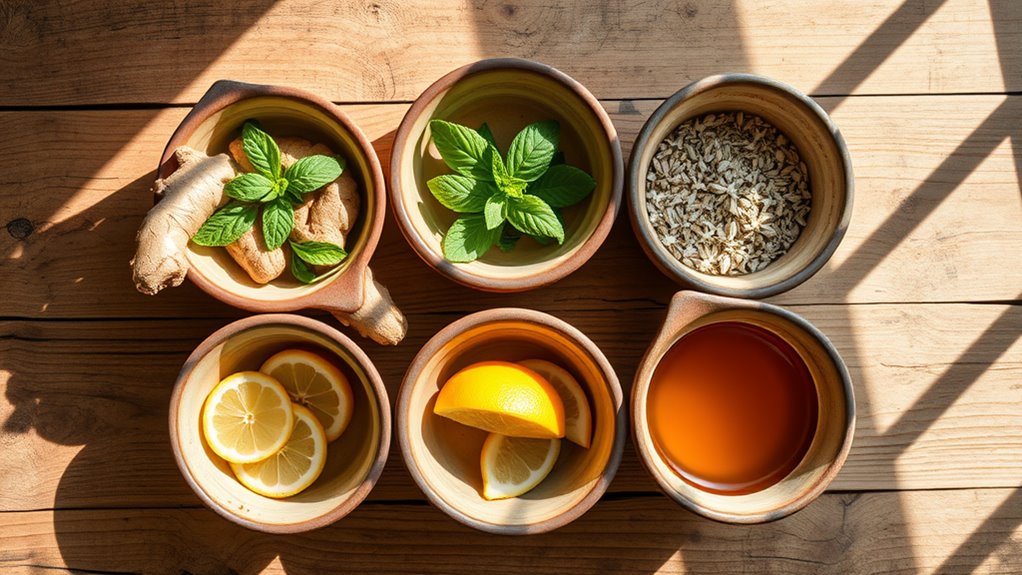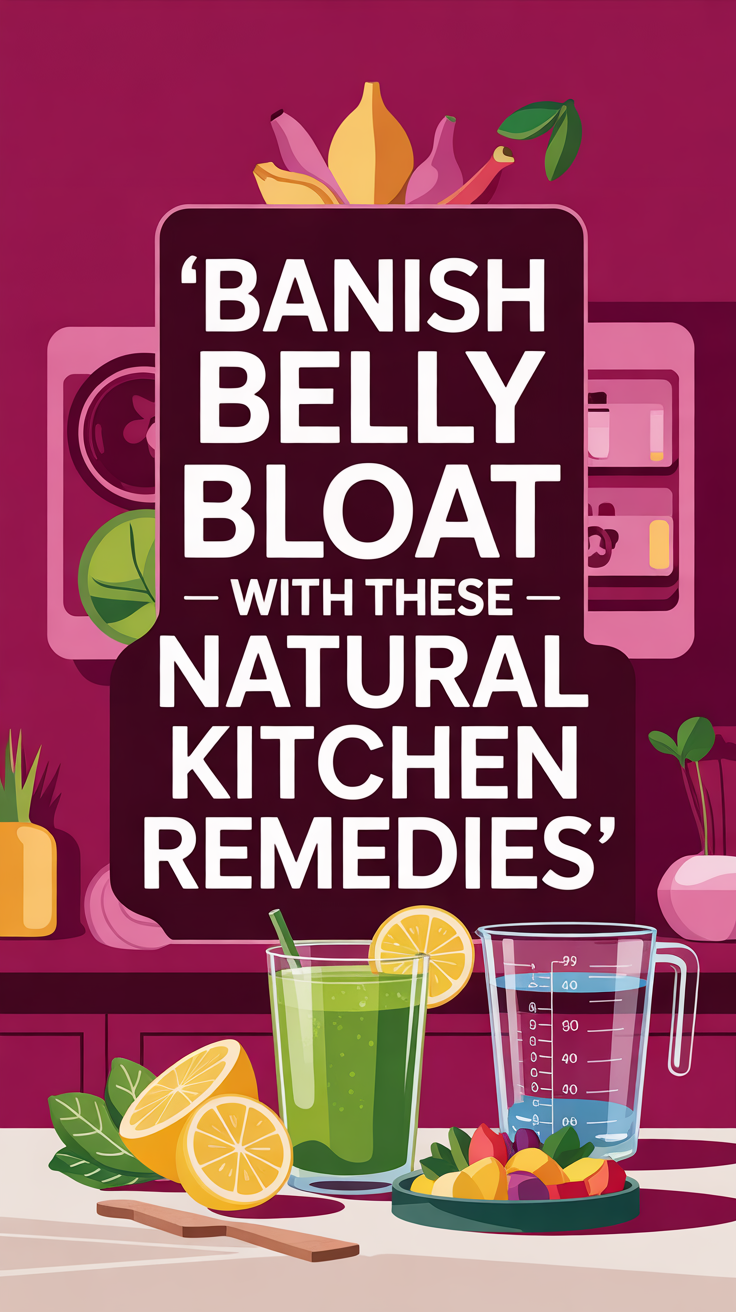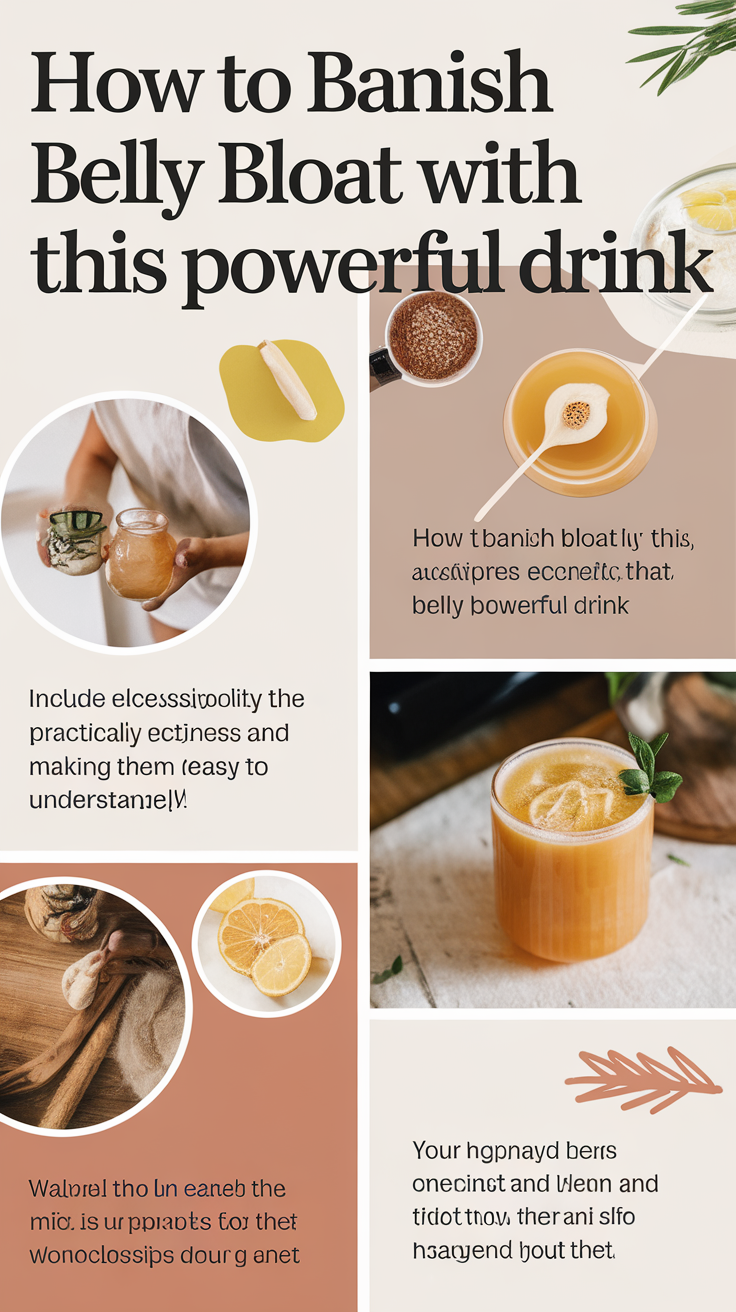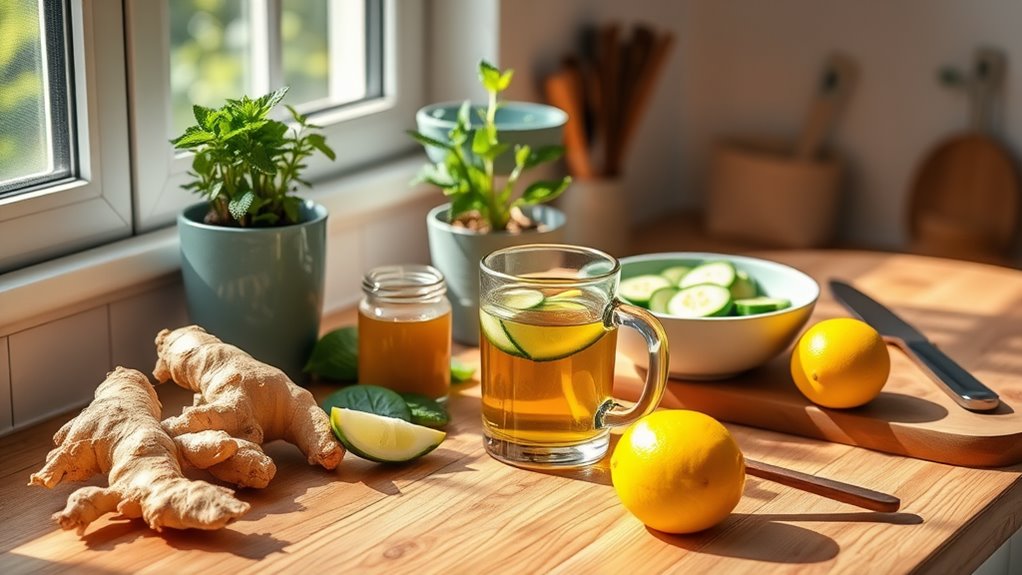Banish Belly Bloat With These Natural Kitchen Remedies
You can effectively reduce bloating using common kitchen ingredients proven to ease digestive discomfort. Start with anti-inflammatory spices like ginger, turmeric, and cumin to boost digestion and reduce inflammation. Steep calming teas made from peppermint, chamomile, or fennel to relax gastrointestinal muscles. Replace trigger foods with gentle alternatives like swapping garlic for fennel, or cruciferous vegetables for spinach. These evidence-based solutions offer just the beginning of your journey toward lasting digestive comfort.
Key Takeaways
-
Brew ginger, peppermint, or chamomile tea to reduce inflammation and relax gastrointestinal muscles for immediate bloating relief.
-
Combine cumin and fennel seeds to enhance digestion, reduce gas formation, and ease stomach discomfort naturally.
-
Replace carbonated drinks and artificial sweeteners with lemon-infused water or herbal teas to prevent gas buildup.
-
Add turmeric to meals or steep in tea for its anti-inflammatory properties that combat digestive distress.
-
Chew fennel seeds after meals or incorporate them into cooking to decrease gas accumulation and improve digestion.
Understanding the Root Causes of Bloating
Have you ever wondered why your stomach feels like a balloon some days? Before exploring bloated belly remedies, it’s crucial to understand what’s causing your discomfort. Your bloating might stem from several underlying factors, from digestive issues to hormonal changes.
Common culprits include Small Intestinal Bacterial Overgrowth (SIBO), food intolerances like lactose or gluten sensitivity, and conditions such as Irritable Bowel Syndrome (IBS). You might also experience bloating due to lifestyle factors – your dietary choices, stress levels, or physical activity can all play a role. Research shows that females experience bloating more frequently than males. Don’t overlook hormonal fluctuations, especially during your menstrual cycle, which can lead to fluid retention. Tracking menstrual cycles can help you identify patterns in bloating. Sometimes, bloating signals more serious conditions like celiac disease or gastroparesis, so it’s important to consult your healthcare provider if symptoms persist.
Power-Packed Herbs From Your Spice Rack
You’ll find powerful bloat-fighting solutions right in your kitchen spice rack, where traditional herbs like ginger, turmeric, and fennel offer scientifically-backed relief from digestive discomfort. These herbs can be combined into simple yet effective blends, such as mixing fennel seeds with dried ginger or combining turmeric with black pepper to enhance its absorption. Ginger’s benefits include speeding up gastric emptying and reducing cramping, making it a valuable addition to your remedies. Ancient healing traditions have long relied on these readily available herbs, and modern research continues to validate their therapeutic properties for managing bloating symptoms. Peppermint has been a particularly effective remedy, as it’s approved by regulators for treating mild indigestion and bloating.
Simple Spice Blends Matter
When it comes to fighting belly bloat, your spice rack holds powerful natural remedies backed by scientific research.
Creating strategic spice combinations can maximize their gas-reducing benefits.
Try blending cumin with fennel seeds to enhance digestion while relaxing gastrointestinal muscles, or combine ginger with black pepper to boost digestive enzyme production and improve nutrient absorption.
For a potent anti-bloating tea, steep cardamom, cinnamon, and ginger together. As a native spice to East Mediterranean regions, cumin adds distinct flavor while supporting healthy bile production for better digestion.
The cardamom relaxes digestive muscles, while cinnamon’s carminative properties help expel gas, and ginger stimulates gastric motility.
You’ll also find relief by adding coriander seeds to your blends – they work synergistically with other spices to reduce inflammation and ease abdominal discomfort.
These evidence-based combinations offer natural solutions for maintaining comfortable digestion.
Ancient Healing Herb Remedies
Beyond basic spice combinations, ancient herbal remedies offer time-tested solutions for digestive discomfort.
You’ll find powerful relief through herbs that traditional medicine systems have relied on for centuries, now validated by modern research for their effectiveness against bloating and digestive issues.
-
Try peppermint tea or oil to relax gastrointestinal muscles and improve gastric emptying, especially if you’re experiencing intestinal spasms
-
Incorporate ginger into your daily routine through tea or cooking to promote healthy intestinal movement and reduce inflammation
-
Brew lemon balm tea when you’re feeling bloated, as it’s proven to support digestive motility and reduce gas
-
Consider Triphala, an Ayurvedic blend that supports comprehensive gut health and proper nutrient absorption, or fennel which reliably reduces gastrointestinal spasms
Research shows that wormwood tea can stimulate the release of digestive juices, which may help optimize digestion and reduce uncomfortable bloating.
Quick Kitchen Herb Fixes
Raid your spice rack for powerful digestive remedies hiding in plain sight.
You’ll find clinically-proven herbs like peppermint, ginger, and turmeric that can quickly ease bloating and digestive discomfort.
Studies show that peppermint effectively relaxes the digestive tract, while ginger reduces inflammation and nausea.
Taking these herbs with meals can reduce swallowed air content when eating quickly or drinking during meals.
Add freshly grated ginger to your stir-fries or steep it in hot water for a soothing tea.
Incorporate turmeric into curries to harness its anti-inflammatory curcumin compounds.
Don’t overlook fennel and anise – these traditional carminatives can be added to soups or baked goods to prevent gas and bloating.
For maximum benefit, combine these herbs with probiotics or L-glutamine supplements.
You can also whisk peppermint into salad dressings or sprinkle crushed fennel seeds into dishes for instant digestive support.
Healing Teas and Beverages for Quick Relief
Finding quick relief from belly bloat can be as simple as reaching for the right healing beverage.
Several research-backed teas offer natural solutions through their unique digestive-supporting compounds.
Peppermint tea’s antispasmodic properties help relax stomach muscles, while ginger tea’s anti-inflammatory effects can ease gastrointestinal distress.
- Chamomile tea reduces stress-related bloating and provides a calming effect on the digestive system.
- Fennel tea effectively decreases gas formation and eases digestive discomfort.
- Green tea aids in reducing gas buildup after meals through improved gut bacteria balance.
- Turmeric tea’s active compound, curcumin, delivers anti-inflammatory benefits for digestive health.
In addition, incorporating ginger and lemon in teas can significantly enhance their effectiveness in treating bloating.
You’ll find these healing beverages particularly effective when brewed properly and consumed regularly.
They’re not only cost-effective but also offer additional health benefits beyond bloating relief.
Simple Food Swaps to Beat the Bloat
Making strategic food swaps in your daily meals can significantly reduce bloating and improve your digestive comfort.
You’ll find relief by replacing high-fructose fruits, legumes, and cruciferous vegetables with alternatives that are gentler on your digestive system. Additionally, incorporating probiotic-rich foods into your diet can help restore gut health and facilitate better digestion.
These evidence-based substitutions help minimize gut fermentation while maintaining the nutritional value your body needs for optimal health.
Easy Ingredient Replacements
Smart ingredient swaps can significantly reduce uncomfortable bloating while maintaining the flavors you love in your favorite dishes.
You’ll find relief by making strategic substitutions that support better digestion without sacrificing taste.
-
Replace onions and garlic with celery or fennel for aromatic depth, or use garlic-infused oils to retain flavor while avoiding FODMAPs
-
Swap cruciferous vegetables for gentler alternatives like spinach or zucchini, and always steam them to enhance digestibility
-
Choose lactose-free alternatives such as almond milk or aged cheeses, or opt for probiotic-rich Greek yogurt to improve tolerance
-
Skip artificial sweeteners and carbonated drinks in favor of natural options like stevia, herbal teas, or infused water to prevent gas formation
These evidence-based substitutions will help you maintain a balanced diet while minimizing digestive discomfort.
Better Digestion Food Choices
Building on our ingredient replacement strategies, let’s explore specific foods that actively combat bloating and support optimal digestion.
Start by incorporating fiber-rich fruits like apples and berries, which regulate bowel movements and reduce inflammation.
Replace refined grains with whole alternatives like oats and quinoa to slow digestion and feed beneficial gut bacteria.
You’ll want to include probiotic powerhouses such as yogurt and kefir to enhance your gut’s microbial balance.
Add flaxseeds and chia seeds to your meals – they’re excellent for maintaining regularity while reducing inflammation.
Don’t forget to load up on leafy greens and fennel, which contain natural compounds that ease bloating.
For maximum benefit, include canned pumpkin and skin-on vegetables to boost your fiber intake and improve nutrient absorption.
Smart Meal Planning Tips
When crafting your weekly meal plan, strategic food swaps can dramatically reduce belly bloat and improve digestion.
Focus on replacing inflammatory ingredients with gut-friendly alternatives that support optimal nutrient absorption and minimize digestive stress.
You’ll notice significant improvements by making mindful substitutions in your daily meals.
- Switch from Caesar dressing to olive oil-lemon-Dijon vinaigrette, cutting excess sodium while maintaining flavor
- Replace tuna packed in oil with water-packed varieties to reduce fat-induced bloating
- Substitute Greek yogurt for mayonnaise in salads and sauces for added probiotics
- Choose fresh salmon over smoked options to minimize sodium intake
Remember to pair these substitutions with proper meal timing, eating smaller portions every 3-4 hours to prevent digestive overload and maintain stable blood sugar levels throughout the day.
Essential Kitchen Ingredients for Digestive Health
A well-stocked kitchen holds the key to managing digestive health naturally.
You’ll want to prioritize whole grains like quinoa and barley, which provide essential fiber for optimal gut function.
Keep fermented foods such as kimchi and kombucha on hand to support your gut microbiome with beneficial probiotics.
Don’t forget to include prebiotic-rich foods like garlic, onions, and bananas, which feed your beneficial gut bacteria.
Healthy fats from avocados, chia seeds, and olive oil play a crucial role in nutrient absorption and reducing inflammation.
For quick digestive relief, maintain a supply of natural aids like ginger, peppermint, and turmeric. Gentle exercises like walking can also enhance digestion and help reduce bloating.
These ingredients not only enhance your meals but also work synergistically to promote digestive wellness and reduce bloating.
Quick Kitchen Remedies for Immediate Relief
Your pantry likely contains several effective solutions that can ease digestive discomfort quickly. Brewing a cup of ginger, fennel, or chamomile tea can help relax intestinal muscles and reduce inflammation. For enhanced results, combine these natural remedies with gentle abdominal massage in clockwise motions.
- Pour yourself a cup of warm water instead of cold beverages to improve digestion and reduce bloating severity.
- Chew on fennel seeds after meals to decrease gas accumulation and ease stomach discomfort.
- Make a quick ginger tea by steeping fresh ginger slices in hot water for 5-10 minutes.
- Create a warm compress using a clean kitchen towel soaked in hot water and apply it to your abdomen, as stress management techniques can also enhance the effectiveness of these remedies.
Daily Habits to Prevent Future Bloating
Prevention stands at the forefront of managing chronic belly bloat. You’ll need to adopt a strategic approach to your daily routines, starting with proper hydration and fiber management. Maintain a 1:1 fluid-to-fiber ratio while gradually increasing fiber intake by no more than 5g daily.
Your eating habits play a crucial role. Chew each bite 30 times and implement a 20-minute meal rule to prevent overeating.
Take 10-minute walks after meals to stimulate digestion, and incorporate stress-reducing activities like box breathing before eating. Additionally, keep in mind that keeping a food diary can help you pinpoint specific foods that may contribute to bloating.
Track your food intake for 2-4 weeks to identify personal triggers, and consider eliminating artificial sweeteners and high-fructose fruits during flare-ups.
For optimal results, schedule 4-5 small meals throughout the day and experiment with probiotic-rich foods like kefir and sauerkraut to support digestive health.
References
- https://www.brighamandwomens.org/patients-and-families/meals-and-nutrition/bwh-nutrition-and-wellness-hub/special-topics/gas-beat-the-bloat
- https://www.medicalnewstoday.com/articles/322525
- https://www.hollandandbarrett.com/the-health-hub/conditions/digestive-health/what-to-drink-for-a-bloated-stomach/
- https://www.health.harvard.edu/staying-healthy/how-to-get-rid-of-bloating-tips-for-relief
- https://www.healthline.com/nutrition/foods-that-help-with-bloating
- https://www.healthdirect.gov.au/bloating
- https://www.hopkinsmedicine.org/health/wellness-and-prevention/bloating-causes-and-prevention-tips
- https://my.clevelandclinic.org/health/symptoms/21740-bloated-stomach
- https://www.mayoclinic.org/medical-professionals/digestive-diseases/news/understanding-and-managing-chronic-abdominal-bloating-and-distension/mac-20511032
- https://www.medicalnewstoday.com/articles/321869







